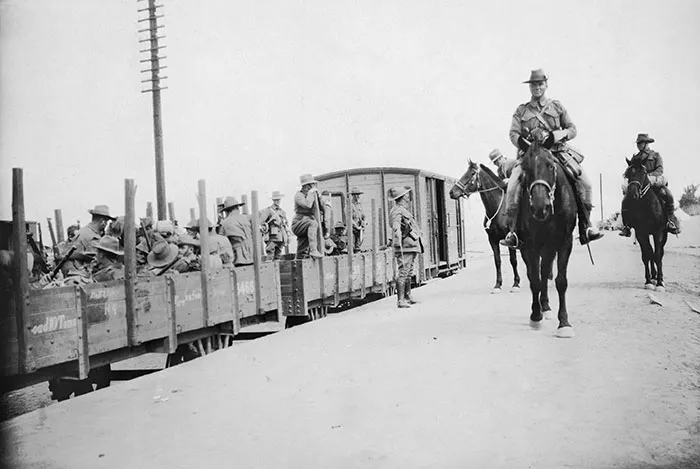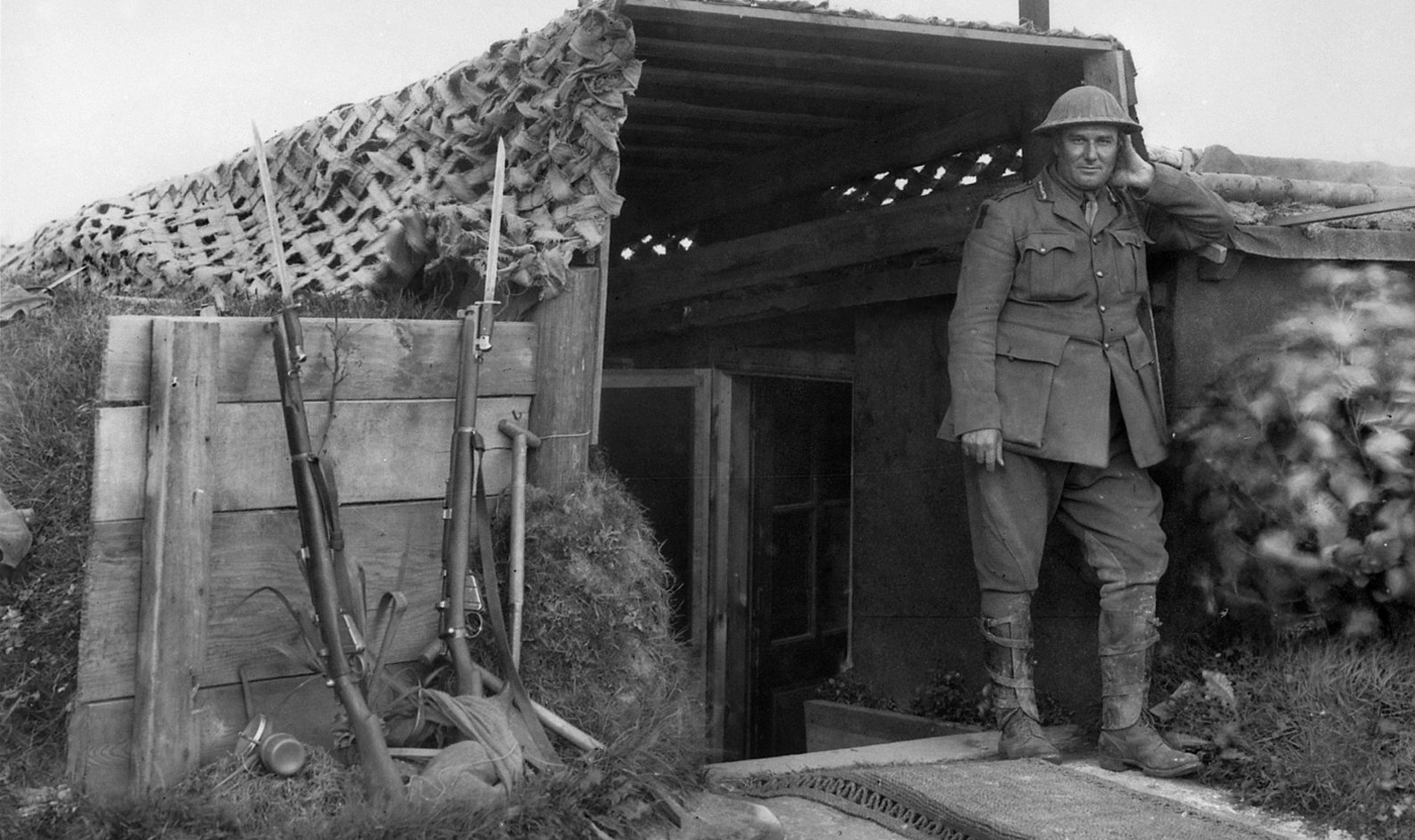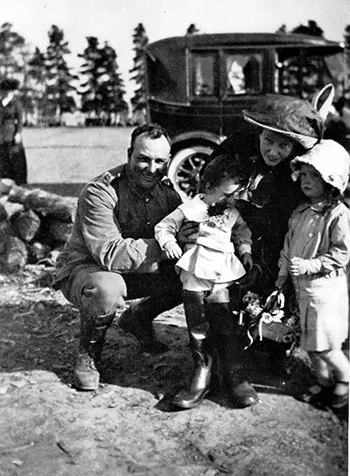POMPEY ELLIOTT
WHO WAS HAROLD ‘POMPEY’ ELLIOT?
Harold Edward Elliott’s significance in Australian war history cannot be overstated — a leader who inspired his troops in the direst of circumstances, able to turn the tide of battle with his fearless demeanour and strategic brilliance. His enduring legacy embodies the spirit of the ANZACs and remains a source of inspiration for generations of Australians.
Born in Charlton, Victoria in 1878, Pompey Elliott was a Boer War Veteran, Senior World War 1 Officer, businessman and politician. A charismatic leader and decorated soldier, Elliott became known not just for his decisive front-line leadership and bravery in battle, but also for his fierce commitment to the welfare of returned soldiers.
‘POMPEY ELLIOTT WAS A REMARKABLE CHARACTER, A HOUSEHOLD NAME. HE WAS AUSTRALIA’S MOST FAMOUS FIGHTING GENERAL, REVERED BY HIS MEN AND BETTER KNOWN OUTSIDE HIS OWN FORMATION THAN ANY OTHER AUSTRALIAN COMMANDER.’
Ross McMullin
THE CALL TO SERVE
Pompey Elliott’s call to military service came at a crucial juncture in Australia’s history. While studying Law at the University of Melbourne, Elliott decided to enlist in the 4th Victorian Imperial Contingent and fight in the Boer War from 1900 to 1902. His dedication and leadership qualities quickly became evident, earning him promotions and respect from his comrades. He served with distinction before returning to Melbourne to complete his studies and later established his own firm of Solicitors, H. E. Elliott & Co., in 1907.
However, his heart remained firmly rooted in the military, and the call to serve his country would soon beckon once again. He returned to the army as a Second Lieutenant in the 5th Infantry Regiment (militia), and he immersed himself in military history and lore to a point where ‘his whole heart and interest were in the Army’ (Charles Bean).
PREPARATION FOR WORLD WAR 1
As tensions escalated in Europe in the lead-up to World War I, Elliott recognized the impending storm. His extensive military experience and leadership made him a natural choice for command, and when the Australian Imperial Force was raised, he was given command of the 7th Battalion in the 2nd Brigade.
‘His massive frame — he had been a good footballer and university champion shot-putter — his energy, strength of character and explosive temper quickly established him as one of the characters of the force’. And it was around this time he was nicknamed ‘Pompey’; after Carlton football player Fred “Pompey” Elliott, a name he wasn’t keen on though it stuck, regardless.
When World War I erupted in 1914, Pompey Elliott and his battalion were among the first to embark on foreign shores. Their destination — the battlefields of Gallipoli, where Elliott’s leadership and tactical acumen would be put to the test once more.
On the day of the Gallipoli landing, 25 April 1915, he was shot in the foot and immediately evacuated to the hospital. Returning in June he went on to command his battalion in the Battle of Lone Pine, repelling Turkish troops in a furious campaign of close combat fighting and bombing that earned Elliott’s squad four out of the seven Victoria Crosses that were awarded at Lone Pine.

Pompey supervising his battalion’s departure from Alexandria on his horse Darkie.
The Gallipoli campaign showcased Elliott’s resilience and strategic acumen. Despite the challenges of the rugged terrain and fierce enemy opposition, he maintained the morale of his troops and ensured their continued effectiveness in battle.
‘POMPEY WAS A BRILLIANT TACTICIAN AND A FIERCE FIGHTER. FOR ANY PRIVATE SOLDIER, YOU WANT TO FEEL THAT YOU ARE BEING COMPETENTLY LED WHILE YOU’RE PUTTING YOUR LIFE ON THE LINE. POMPEY’S MEN HAD THAT FAITH, WHICH STEMMED FROM THE WAY HE TREATED HIS RESPONSIBILITIES WITH PASSIONATE SERIOUSNESS — THEY KNEW THAT HE KNEW HIS STUFF.’
Ross McMullin
BATTLES ON MULTIPLE FRONTS
After the evacuation of Gallipoli, Elliott was promoted to Brigadier General in command of the newly formed 15th Brigade, which was sent to France to fight on the Western Front. It was after the catastrophic battle of Fromelle, where some 5,533 lives were lost in a single night (around 1,800 were from Elliott’s brigade), that he began to clash with his superiors and what he saw as reckless decision-making.
Despite repeated attempts to overturn their decision citing inexperience and concern for the wide open terrain, Elliott was overruled, and the resulting casualties were more than that of the Boer War, Korean War and Vietnam War combined.
Survivors recall seeing Elliott ‘with tears streaming down his face as he shook hands with the pitiful remnant of his brigade’, and at one stage calling out to a nearby Captain, Bill Trainor in despair, ‘Good God Bill, what’s happened to my Brigade?’
Elliott continued to command the 15th Brigade on the Western Front, including during the battles of Amiens, Villers-Bretonneux, Péronne, and Polygon Wood, cited as one of the defining moments of Elliott’s career — despite facing some of the most intense fighting of the war, his tactical brilliance and unwavering leadership is credited to the success of the Australian forces in a pivotal engagement. Elliott’s exceptional leadership did not go unnoticed. He received promotions, became a Brigadier General, and earned several awards for his bravery, including the Distinguished Service Order (DSO) and Bar and the Companion of the Order of St Michael and St George (CMG).

Brigadier General Harold ‘Pompey’ Elliott outside a captured German headquarters during the Somme offensive of 1918.
POLITICS: A DIFFERENT KIND OF WAR
Elliott arrived back in Melbourne in June 1919 on the RMS Orontes, and returned to practicing Law before running as a candidate for the National Party in the Federal Election later that year, ‘achieved the greatest popular vote of any Victorian candidate for the Senate’.
This success was repeated at the 1925 election, and he used his platform to address his wartime grievances, taking fire at the British High Command whom he blamed for the heavy Australian casualties during the war. He was as outspoken here as he was on the battlefield, and although ‘not naturally suited to life in the federal parliament’ he made significant contributions to improving the affairs of returned soldiers, helping them with employment, legal advice, pensions and advocacy.
LEGACY: POMPEY ELLIOTT’S ENDURING IMPACT
Pompey Elliott’s legacy extends far beyond his remarkable military career, marked by his devotion to his troops and his exceptional leadership qualities. His impact on Australian war history and his connection to the Camberwell RSL Club serves as a testament to his enduring influence.
Elliott’s unwavering courage and leadership continue to inspire generations of Australians. His story serves as a reminder of the sacrifices made by those who served in World War I and Pompey Elliott’s deep connection to Camberwell is reflected in his association with the Camberwell RSL Club. The club proudly honours his memory, and his legacy lives on through the community he cherished.
The Camberwell RSL Club pays tribute to Pompey Elliott with the ‘Elliott Room’, a dedicated space that houses memorabilia and artifacts related to his life and military service. This room serves as a living memorial, allowing visitors to learn about his extraordinary journey.
As we remember Pompey Elliott and his contributions, we invite you to join us in continuing his legacy. By becoming a member of the Camberwell RSL Club, you support the preservation of his memory and the ongoing recognition of his service to our nation.
Article Outline
- Who was Harold
‘Pompey’ Elliott? - The Call to Serve
- Preparation for WW1
- Battles on Multiple Fronts
- Politics: A Different
Kind of War - Legacy: Pompey Elliott’s
Enduring Impact

Pompey Elliott with his wife Kate Campbell and his children Violet and Neil at Broadmeadows before his departure from Australia in 1914.
STAY CONNECTED
For all the latest news, updates and event announcements please follow Camberwell RSL on our community social channels, and tag us #camberwellrsl in your own club related content and stories.
